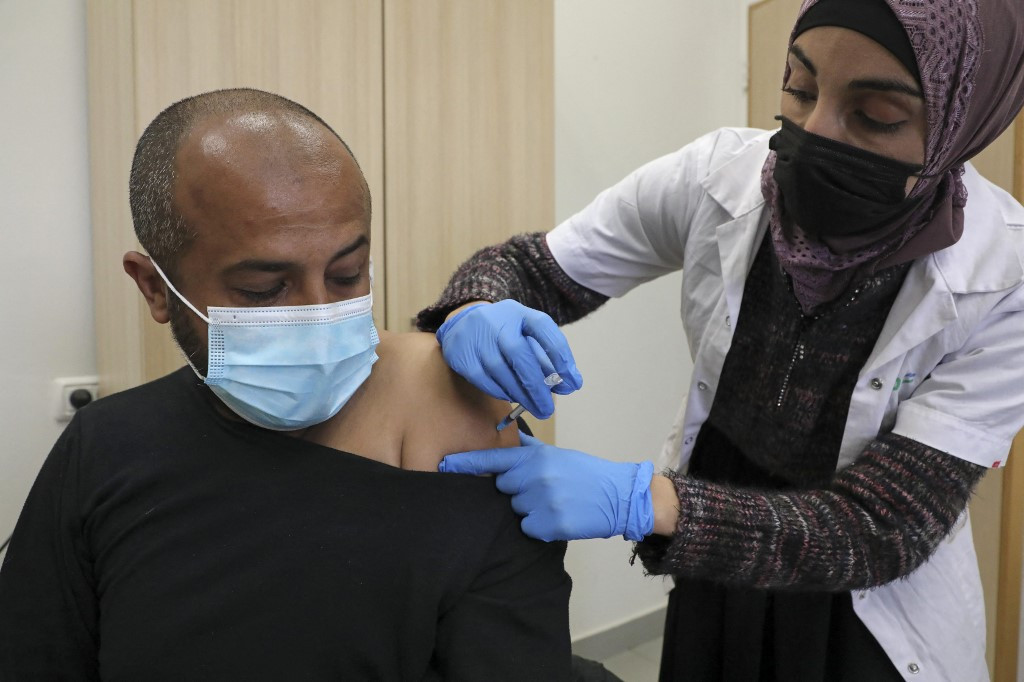Popular Reads
Top Results
Can't find what you're looking for?
View all search resultsPopular Reads
Top Results
Can't find what you're looking for?
View all search resultsThe Negev Bedouin: Israel's vaccine blind spot
Change text size
Gift Premium Articles
to Anyone
 A healthcare worker administers a shot of the Pfizer-BioNtech Covid-19 vaccine to a man at a clinic in the Negev's main Bedouin town of Rahat, on Feb. 17. Deep in the Negev desert, Bedouin residents of villages deemed illegal by Israel say more houses have been demolished than people vaccinated, despite the Jewish state's world-beating coronavirus inoculation drive. (AFP/Hazem Bader)
A healthcare worker administers a shot of the Pfizer-BioNtech Covid-19 vaccine to a man at a clinic in the Negev's main Bedouin town of Rahat, on Feb. 17. Deep in the Negev desert, Bedouin residents of villages deemed illegal by Israel say more houses have been demolished than people vaccinated, despite the Jewish state's world-beating coronavirus inoculation drive. (AFP/Hazem Bader)
D
eep in the Negev desert, Bedouin residents of a village deemed illegal by Israel say more houses have been demolished than people vaccinated, despite the Jewish state's world-beating coronavirus inoculation drive.
"No one is vaccinated here," said Adnan Al-Abari, a maintenance worker at the school in Tal Arad.
Israel is a global leader in coronavirus vaccinations per capita, having administered both recommended jabs of the Pfizer/BioNTech vaccine to roughly a third of its nine million citizens.
Prime Minister Benjamin Netanyahu has said authorities are on track to fully inoculate the entire over-16 population by the end of next month.
But in the "illegal" Bedouin villages in the arid Negev desert of southern Israel, the vaccination rate is around two percent, according to official data.
Tel Arad residents say they have not been visited by a single health worker since the pandemic began.
But demolition orders have continued to arrive, targeting houses built without impossible-to-obtain permits.
"Here there are more houses destroyed than people vaccinated by Israel," Abari said.
Bedouin have lived in the Negev desert for generations, but under Israeli rule have become marginalised and often live in poverty.
The Jewish state's effort to transfer Bedouin to recognised towns has fuelled tensions.
The Association for Civil Rights in Israel says Tel Arad, which has no electricity or running water, is just one of dozens of unrecognised Bedouin villages in the region.
"Everything that currently exists in the village is illegal and cannot be legalised because the law alleges that it does not exist," the association said.
"Residents of the unrecognised villages cannot receive building permits, and the structures in the villages are accordingly designated as 'unauthorised'," it added.
Abari said that a neighbour's house was recently torn down, reduced to a pile of dust and twisted metal.
"Look at this house," he said, pointing to a separate canary-yellow cottage he said had also received a recent demolition notice.
"It will be demolished next month."
The father of five told AFP that Israel had not sent "anyone to explain the (coronavirus) crisis or to help us."
Tel Arad, where goats scour the rocky hillside for blades of grass, does not have reliable internet access, making pandemic coping strategies like remote schooling impossible.
Abari said his 12-year-old son Yussef had not had a lesson in more than a year.
Yet the demolitions have continued.
Patchy web access hasn't stopped anti-vaccine conspiracy theories spreading via WhatsApp, text message or word of mouth.
In Tel Arad, many fear that the jab will alter their genes, make them sterile or even contain a microchip allowing Israeli security services to track their movements.
About 60 percent of Israel's 290,000 Bedouin live in villages or towns which are officially recognised.
But despite having clinics, schools and public services, fewer than a fifth of residents in these communities have received even one vaccine injection, according to official data.
"Fake news travels faster than real information," said Mazem Abu Siyam, a doctor coordinating the vaccination campaign for Negev Bedouin.
"There is really this fear of the long-term effects."
"We are a traditional community and it's difficult to convince people to get vaccinated, to adopt a new technology."
Jameh Abu Odeh, a 36-year-old lawyer in the Negev's main Bedouin town of Rahat -- population 22,000 -- won a small victory over such fears.
After telling relatives about the benefits of vaccination, he convinced his mother to get inoculated.
"Everyone is afraid of the vaccine! In fact it's a mixture of fear and confusion about the side effects," he said, as a nurse injected his frail, shy mother in the arm.
"We must not forget also that here many don't know how to read".
Bedouin elder Ibrahim Leamor, 70, blamed "ignorance" as the primary cause of anti-vax sentiment.
In his village of Kuseife, fewer than 10 percent have received the jab.
He quotes the Koran to convince the most reluctant.
"'The prophet said that every disease has its remedy,' and today this remedy is called the vaccine," Leamor said.
Abu Siyam said that in recognised villages, Bedouins have begun to accept the vaccine.
"We are only just beginning to overcome fear [...] I hope this is the start of a boom."










